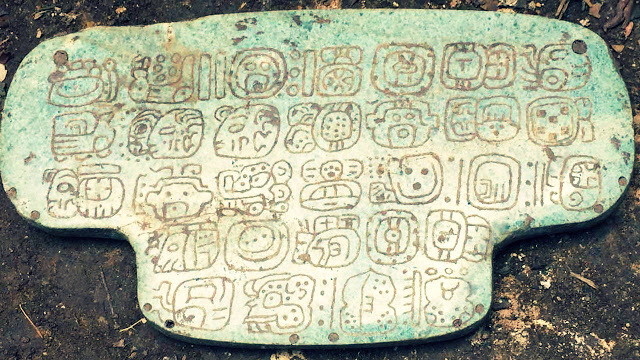Mystery Liontin King Maya Tribe And Ritual Gods Wind
More recently, archaeologists were surprised by the discovery of a mystery Mayan King's precious locket in Nim Li Punit, southern Belize. Excavation of archaeological sites found a large piece of jade carved and possibly belonged to an ancient Mayan king. Jade pendant gems worn on the king's chest during a key religious ceremony, this is the first discovery of a site excavation since 2015.
Mystery of the Mayan King's Pendant

This pendant is considered very remarkable and its second largest size after the findings of Maya Jade in Belize. The pendant was 7.4 inches wide and 4.1 inches tall and 0.3 inches thick. According to archaeologist Braswell, this stone is the only one found with the text of the history, the pendant carved with 30 hieroglyphs that tells of its first owner. It tells a short but important story, and probably will change the view of the Maya all along. In addition, the pendant is not damaged in historical age and protected from the treasure hunters.
Mystery of the Mayan King's Pendant
The stone was found at the excavation site Nim Li Punit, is a small site in Toledo District of Belize. The site is on a ridge in the Maya Mountains, near the village of Indian Creek. Areas that include wet areas and rain for nine months of the year. The site is located in the southeast of the ancient Mayan town zone, about 250 miles south of Chichen Itza in Mexico. Nim Li Punit is estimated to have been populated and developed between 150 and 850 AD.
Archaeologists led by Braswell have dug up a ruined palace and an intact tomb built around AD 400. Inside a tomb built around 800 AD, found 25 pottery, a large stone that has been flattened into a form of god and chest made of precious jade. Also found some teeth, but not found the remains of human skeletons.
site of Nim Li Punit, a virtual tribal site
The mystery of the Maya T-shaped Mayan pendant is a glyph "ik" aksara also an abbreviation of "wind and breath". One pot was found beside it, an artifact with a beaked face, probably depicting the Mayan wind god. The wind is considered very important by the Maya, bringing in the annual rain that makes plants grow. And the Mayan king as the divine ruler is responsible for the surrounding weather, performing rituals according to the sacred calendar, burning and scattering incense to be carried away by life-giving wind and rain. According to Braswell, this pendant inscription was first used in 672 AD with such rituals.
Two reliefs on a large stone slab in Nim Li Punit illustrate the use of a pendant. The king is shown wearing a T-shaped pendant and performing incense scattering in 721 and 731 AD, about 50 and 60 years after the locket was first worn. In the year 800, the pendant is buried not side by side with the owner, but only with other objects. According to archaeologists, the locket is not a person's jewelry and has great power and magic.
The Mayan kingdom collapsed along Belize and Guatemala around AD 800, where population levels plummeted, including Nim Li Punit also abandoned. A theory reveals that the drought-causing Mayan climate change has caused agricultural failure and the collapse of Mayan civilization. This tomb is dedicated to the Wind God who brought the yearly rain which at that time was in crisis.
Inscription written behind the locket mentions; The pendant was made for King Janaab 'Oh! K'inich. In addition to noting the first use of pendants in 672 AD for scattering incense ceremonies, hieroglyphs depicted the king's origins. While her mother is Midas, a remote site in western Belize. The king's father died before the age of 20 and may have come from somewhere in Guatemala.
The mystery of the Mayan King's locket and its site also depicts the king's accession ceremony in 647 AD, possibly linking the king to the powerful and large Mayan city of Caracol, located in modern-day Belize. This site tells about politics that is far from Nim Li Punit. Midas, the birthplace of the king's mother is 60 miles from the site. Braswell believes that the Pendant is telling of the arrival of nobles in Nim Li Punit, who tells of the establishment of a new dynasty.
Until now, archaeologists still have not found the right reasons, why the stone pendants were buried on this site, away from the owner. There is an indication of trade that the rock came from the mountains of Guatemala, southwest of Belize.
Reference
A Pendant Fit for a King, 23 february 2017, by University of California - San Diego
Maya politics and ritual: An important new hieroglyphic text on a carved jade from Belize. Ancient Mesoamerica, 2016; 27 (02): 267 DOI: 10.1017 / S095653611600033X